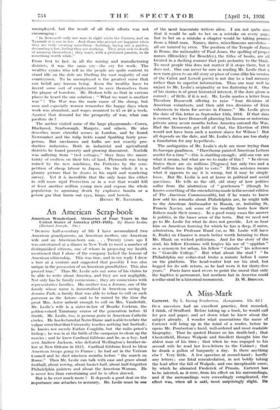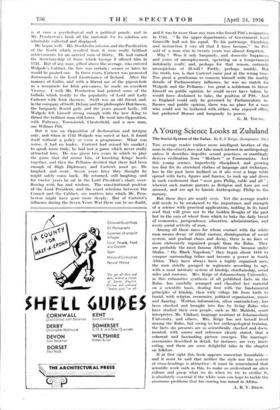A Miss-Mark
Carteret. By L. Baring Pemberton. (Longmans. 12s. W.)
OUR ancestors had an excellent practice, first recorded, I think, of Strafford. Before taking up a book, he would call for pen and paper, and set down what he knew about the subject already. I wonder what associations the name of Carteret will bring up in the mind of a reader, before he opens Mr. Pemberton's lucid, well-ordered and most readable biography. That he quoted Homer on his death-bed ; that Chesterfield, Horace Walpole and Smollett thought him the ablest man of his time ; that when he was engaged to his second wife he read her love-letters to the Cabinet ; that he drank a gallon of burgundy a day. Is there anything else ? Very little. A few speeches at second-hand ; hardly any letters ; one fatal- miscalculation, in not boldly taking the lead after the fall of Walpole, and one inexplicable error, by which he alienated Frederick of Prussia. Carteret has to be inferred, as it were, from his effect on his surroundings, and if the surroundings were exceedingly complicated, the effect was, when all is said; most surprisingly siighi.Lis
is at once a psychological and a political puzzle, and in Mr. Pemberton's book all the materials for its solution are admirably collected and displayed.
He began well. His Stockholm mission and the Pacification of the North which resulted from it were really brilliant achievements for an untried man of thirty. He had earned the Secretaryship of State which George I offered him in 1721. But of any man, gifted above the average, who entered Walpole's Cabinet, the fate was certain ; sooner or later, he would be pushed out. In three years, Carteret was promoted downwards to the Lord Lieutenancy of Ireland. After the manner. of Gallio, and with a liberal use of the pigeon-hole as a receptacle for Irish grievances, he made an excellent Viceroy. I wish Mr. Pemberton had printed some of the ballads which testify to the popularity of Lord and Lady Carteret with Irish rhymers. Swift was an old friend, and, in the company of Swift, Delany and the philosophic Hutcheson, the burgundy flowed gaily and the years passed lazily, till Walpole felt himself strong enough with the new King to thrust the brilliant man still lower. He went into Opposition, with Pulteney, Townshend, Chesterfield, and a new man, one William Pitt.
But it was an Opposition of declamation and intrigue only, and when in 1742 Walpole was outed at last, it found itself without a policy or even a programme. What was worse, it had no leader. Carteret had missed his market ; to speak more truly, he had lost a game which never really attracted him. He was given two years in which to play the game that did amuse him, of knocking Kings' heads together, and then the Pelhams decided that there had been enough of High Diplomacy and Carteret must go. He laughed, and went. Seven years later they thought he might safely come back. He returned, still laughing, and for twelve years he sat in the Lord President's chair, over- flowing with fun and wisdom. The constitutional position of the Lord President, and the exact relations between the Council and the Cabinet, are matters into which Mr. Pem- berton might have gone more deeply. But of Carteret's influence during the Seven Years War there can be no doubt, and it was he more than any man who.forced Pitt's resignation in 1761. "In the upper departments of Government, Lord Granville had not his equal. To his patronage, friendship and instruction I owe all that I have become." So Pitt said of a man who in twenty years was almost forgotten.
Why ? Was it only burgundy, and domestic happiness, and years of unemployment, operating on a temperament indolently exa/te, and, perhaps for that reason, curiously unsuspicious of ill-wilt? Partly, perhaps mainly. But the truth, too, is that Carteret came just at the wrong time. Too great a gentleman to concern himself with the muddy details of Parliamentary influence, he was no match for Walpole and the Pelhams : too great a nobleman to throw himself on public opinion, he could never have taken, he would have disdained to take, the position of Pitt. And as England could only be governed by Parliamentary in- fluence and public opinion, there was no place for a man who could not be bothered with either, who enjoyed office, but preferred Homer and burgundy to power.
G. M. YOUNG.



















































 Previous page
Previous page